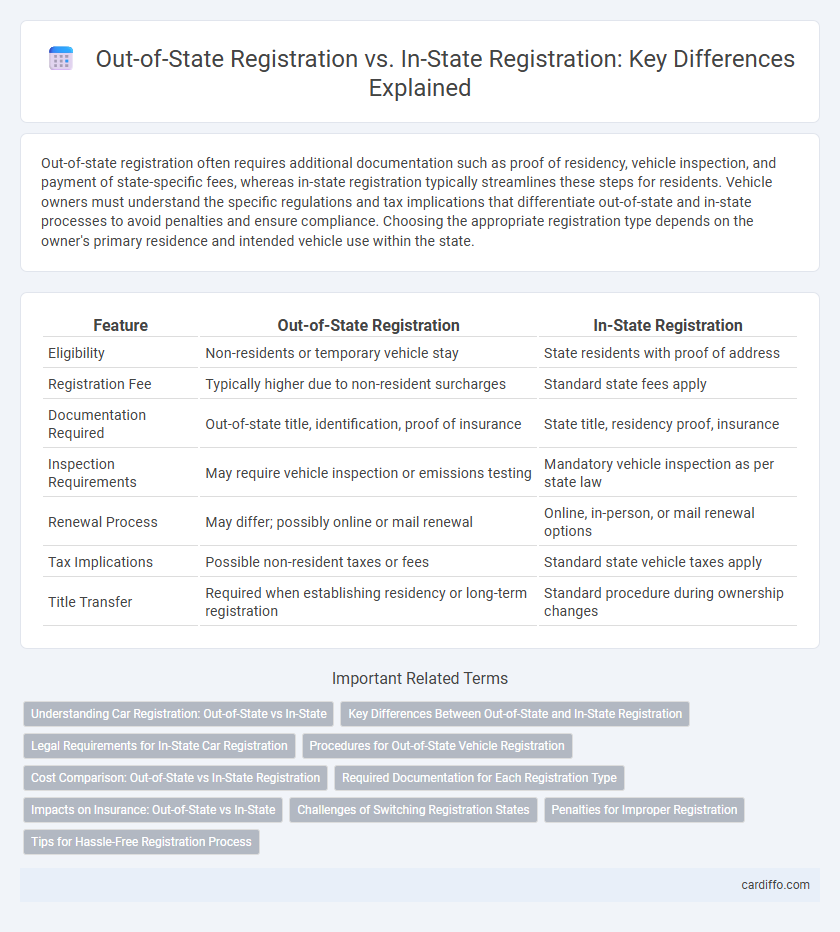Out-of-state registration often requires additional documentation such as proof of residency, vehicle inspection, and payment of state-specific fees, whereas in-state registration typically streamlines these steps for residents. Vehicle owners must understand the specific regulations and tax implications that differentiate out-of-state and in-state processes to avoid penalties and ensure compliance. Choosing the appropriate registration type depends on the owner's primary residence and intended vehicle use within the state.
Table of Comparison
| Feature | Out-of-State Registration | In-State Registration |
|---|---|---|
| Eligibility | Non-residents or temporary vehicle stay | State residents with proof of address |
| Registration Fee | Typically higher due to non-resident surcharges | Standard state fees apply |
| Documentation Required | Out-of-state title, identification, proof of insurance | State title, residency proof, insurance |
| Inspection Requirements | May require vehicle inspection or emissions testing | Mandatory vehicle inspection as per state law |
| Renewal Process | May differ; possibly online or mail renewal | Online, in-person, or mail renewal options |
| Tax Implications | Possible non-resident taxes or fees | Standard state vehicle taxes apply |
| Title Transfer | Required when establishing residency or long-term registration | Standard procedure during ownership changes |
Understanding Car Registration: Out-of-State vs In-State
Car registration requirements vary significantly between out-of-state and in-state processes, affecting vehicle titling, fees, and documentation. In-state registration typically involves submitting proof of residency, vehicle inspection certificates, and paying state-specific taxes, whereas out-of-state registration may require fulfilling the new state's emission standards and re-titling the vehicle. Understanding these distinctions ensures compliance with local DMV regulations and avoids penalties or registration delays.
Key Differences Between Out-of-State and In-State Registration
Out-of-state registration typically requires proof of residency in the vehicle's new state, whereas in-state registration mandates local address verification and compliance with state-specific emissions and safety standards. Fees for out-of-state registration may include penalties or additional taxes that are not applicable for in-state registration, reflecting the administrative costs of transferring vehicle ownership across jurisdictions. Insurance requirements often differ, with some states demanding updated policies or endorsements when switching from out-of-state to in-state registration.
Legal Requirements for In-State Car Registration
In-state car registration requires proof of residency, such as a utility bill or lease agreement, and compliance with state-specific emissions and safety inspections. Vehicle owners must provide a valid driver's license and proof of insurance that meets the state's minimum coverage standards. Registration fees vary by state and often include title transfer costs, with deadlines typically set within 30 to 60 days of establishing residency.
Procedures for Out-of-State Vehicle Registration
Out-of-state vehicle registration requires submitting a completed application, proof of vehicle ownership, current out-of-state registration, and valid identification to the local Department of Motor Vehicles (DMV). Vehicle inspection or emissions testing may be necessary depending on state regulations to ensure compliance with safety and environmental standards. Paying applicable registration fees and providing proof of insurance are essential steps to complete the out-of-state registration process.
Cost Comparison: Out-of-State vs In-State Registration
Out-of-state vehicle registration typically incurs higher fees than in-state registration due to non-resident surcharges and additional administrative costs. In-state registration fees often include local taxes and standard licensing costs, which are generally lower for residents. Understanding the detailed fee structure for each state or jurisdiction helps vehicle owners accurately compare potential registration expenses.
Required Documentation for Each Registration Type
Out-of-state registration typically requires proof of residency in the new state, the vehicle title, a valid driver's license, and a completed application form. In-state registration mandates proof of identity, vehicle ownership documents, proof of insurance, and sometimes a vehicle inspection report. Both registration types may also require payment of applicable fees and emission test certificates depending on state regulations.
Impacts on Insurance: Out-of-State vs In-State
Out-of-state vehicle registration often leads to higher insurance premiums due to differing state regulations and risk assessments. In-state registration typically offers more competitive rates as insurers have better data for local driving patterns and claims history. Understanding these impacts helps drivers make informed decisions on registration to optimize insurance costs.
Challenges of Switching Registration States
Switching registration from an in-state to an out-of-state vehicle registration often involves complex challenges such as differing state laws, varying fees, and strict documentation requirements that can delay the process. Vehicle owners must navigate unique tax obligations, emissions testing, and insurance regulations specific to the new state, which can lead to unexpected costs and administrative burdens. Failure to comply with these state-specific mandates increases the risk of penalties and legal issues, complicating the transition.
Penalties for Improper Registration
Failing to properly register a vehicle either out-of-state or in-state can result in significant penalties, including fines, vehicle impoundment, and increased insurance premiums. Out-of-state registration violations often incur higher fees and extended legal consequences due to unmet residency requirements. In-state improper registration may lead to state-specific penalties such as registration suspension and citations enforced by local law enforcement agencies.
Tips for Hassle-Free Registration Process
Ensure all required documents such as proof of residency, vehicle title, and insurance are prepared before initiating the registration process for both out-of-state and in-state applications. Verify specific state regulations and deadlines online or through the DMV to avoid delays and additional fees during the vehicle registration. Utilize online registration portals when available to streamline the process and reduce wait times at local offices.
Out-of-State Registration vs In-State Registration Infographic

 cardiffo.com
cardiffo.com